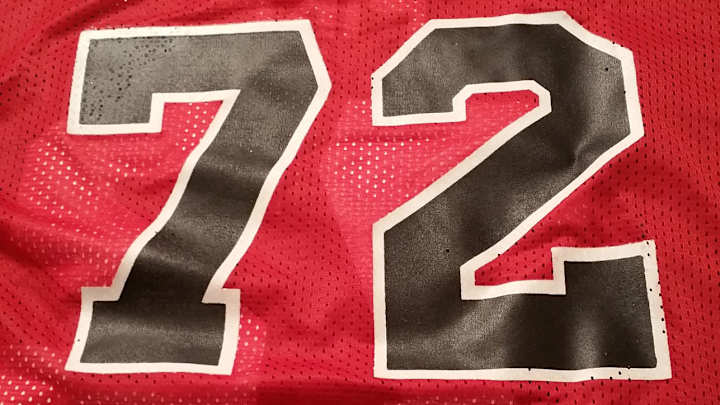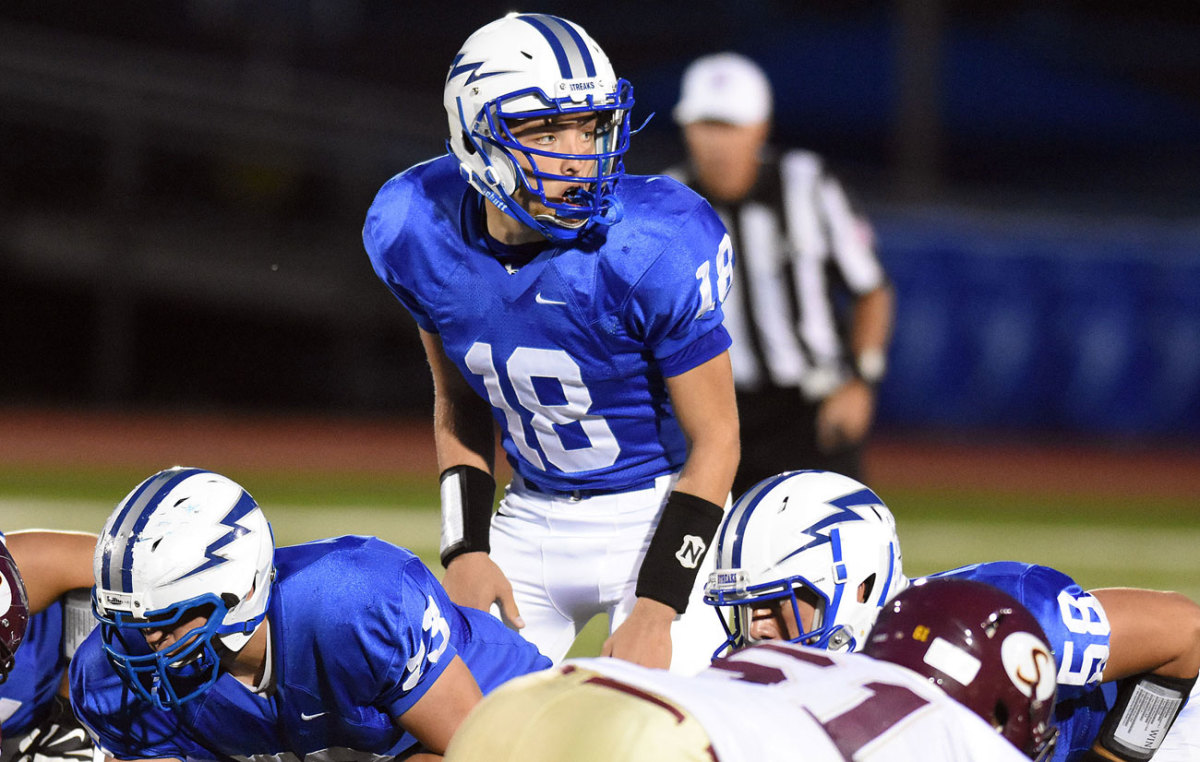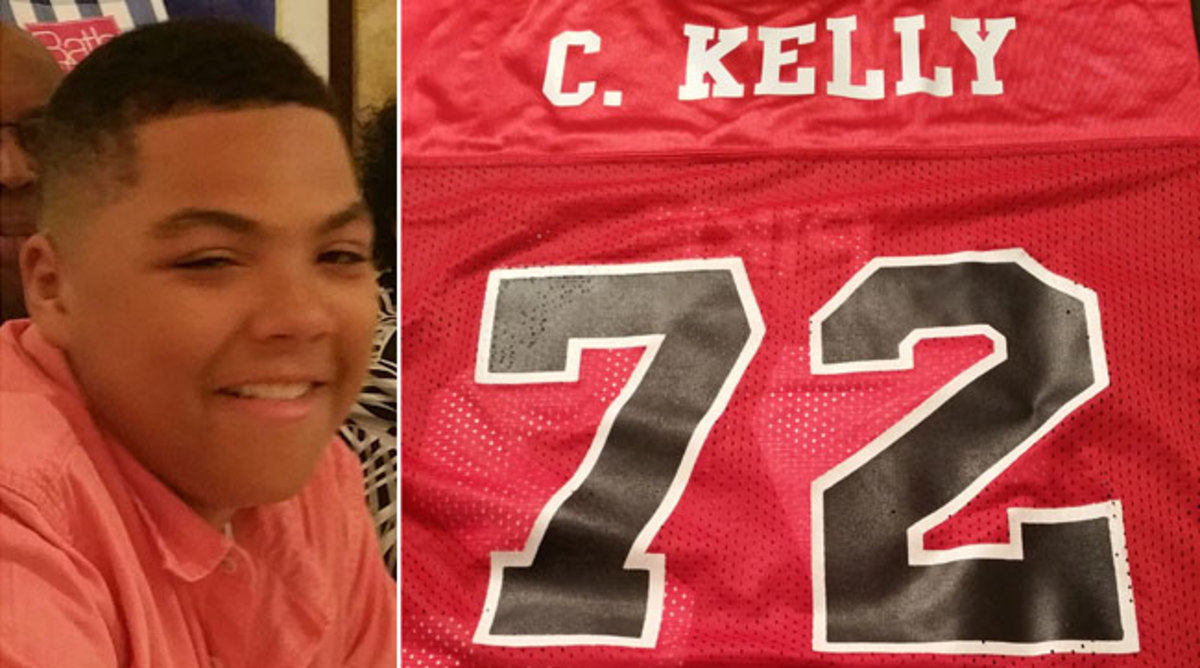The Game’s Tragic Toll

BY KALYN KAHLER AND DAN GREENE
IN-SEASON INCIDENTS
Tyrell Cameron
“Tyrell was a very friendly guy, very likable and quiet,” says Barry Sebren, head coach of Franklin Parish football in Winnsboro, La. “He always had a smile on his face.” On Sept. 5, the 16-year-old junior suffered a critical injury on a punt return. Cameron was wheeled off the field and an on-site ambulance rushed him to Franklin Medical Center, where he died later that night. Local news station KNOE reported the official autopsy results: a broken neck that caused internal bleeding. Sebren confirms that report, saying Cameron died from a cervical break. “He never moved after he got hit. I think it was instantaneous.”

Sebren refers to the play in question as an incidental headbutt. “He was changing directions and his right foot dragged to the ground and caused him to stumble. His head went down, and that’s it.” Sebren said his heart sank when he looked at the game tapes. “I knew what had happened the moment I watched the film,” he says. “I didn’t need a coroner’s report.”
Franklin Parish played its next game the following Thursday night, less than a week later. “I really think our players were scared, I really do,” says Sebren. “But it was so important for us to get back out there and say, Live on.”
In the wake of the tragedy, Sebren and his staff have talked about ways to improve player safety. But he’s not sure what he can do differently. Franklin Parish can’t afford to hire a full-time athletic trainer, and this season Sebren focused on taking the head out of football by adopting the Seattle Seahawks’ approach to tackling. He also began to limit contact in practice. “We watched film on it, we practiced it, we drilled it, and this happens. It was just a freak accident that his head was involved in the play.”
Ben Hamm
Ben Hamm was a spirit leader. He dressed head-to-toe in Mustangs gear and led the cheers in the student section at Wesleyan Christian School athletic events. When it came to football games, he was a leader on the field. “He was enthusiastic, full of energy, full of life, got along with everybody,” says Rocky Clark, superintendent of the small private school in Bartlesville, Okla. On Sept. 11 the 16-year-old junior linebacker went for a tackle on a kickoff return in the fourth quarter. Hamm suffered a critical injury what appeared to be a routine play, and an ambulance on site for the game rushed him to Saint Francis Hospital in Tulsa, where he had emergency surgery to relieve pressure in his brain. Doctors performed second surgery but were unable to relieve the pressure. Ben’s father, Steve, shared on Facebook that his son’s condition worsened because of a lack of oxygen in his blood. Ben died eight days after the incident.

The Mustangs continued with the season, although Clark says two players quit, afraid to play because of what happened to their teammate. Clark and the Wesleyan Christian Athletic Committee are looking at ways to improve player safety. At each game, Clark says, the school has an ambulance and EMTs on site, but, “Any time an incident occurs, no matter what you are doing, you take a look and ask, what can we do better?” Wesleyan Christian doesn’t have the budget to hire a full-time athletic trainer, but parents are currently trying to help raise funds to make that possible. Clark says he’s also taking ideas from other administrators. Nearby Dewey School District tracks student concussions across all sports, and after three concussions the student can no longer participate in school athletics. “We need to collect data on that and get enough information so that when we are making decisions on these kids, the past is not forgotten,” Clark says.
Rod Williams
A 5-11, 300-pound junior offensive lineman known to crack up teammates by impersonating coaches, Rod Williams collapsed to the ground while waiting for his second or third turn taking on a blocking dummy in a Sept. 22 practice, according to Burke County (Ga.) High head football coach Eric Parker. It was the first drill of practice, approximately six or seven minutes in. The school’s athletic trainer, who Parker says monitors most of the team’s practices, administered CPR during an approximately seven or eight minute wait for paramedics to arrive. An ambulance took Williams to nearby Burke Medical Center, where doctors were able to stabilize him. He remained hospitalized until dying on Oct. 6.
According to Burke County coroner Susan Salemi, Williams died of hypertensive heart disease that led to a pulmonary edema, causing his lungs to fail. The school “did everything to save” Wiliams, Salemi told The Atlanta Journal-Constitution. Temperatures were in the mid- to high-70s on the afternoon Williams collapsed. He had passed the required sports physical over the summer. Parker says there are no planned changes to the physical specifications or the preseason screening process. “I don’t know if there is anything else that we could have done with the information we had,” Parker says. “We try to follow protocol that keeps our kids protected as best they can. That was just a really, really unforeseen and unfortunate incident.”
Evan Murray

Evan Murray was a respected leader and a three-sport athlete at Warren Hills High in Washington, N.J. “The kind of a person who, as a coach, I want on my team,” Warren Hills athletic director Peter Lubrecht says. “His outlook was always team first. You saw it in every sport he played. He was a true leader, a gentleman.”
On Sept. 25, the 17-year-old senior quarterback took a hit in the backfield in the second quarter of the Blue Streaks game against Summit High. According to NJ.com, Murray walked off the field with the help of teammates. He collapsed on the sideline and was taken to Morristown Medical Center, where he died later that night from massive internal bleeding due to a lacerated spleen. According to a statement released by the Morris County medical examiner, Murray had an abnormally enlarged spleen and was therefore more prone to injury.
Warrens Hills postponed its next game and then played out the rest of the season. “There was never any discussion that the season would not go on,” assistant superintendent Earl Clymer says. The Blue Streaks finished out a successful regular season and lost in the first round of the Mid-State 38 Raritan Division playoffs to Old Tappan High School.
Clymer says that Warren Hills Regional School District does employ full-time athletic trainers. That practice is well above New Jersey State Interscholastic Athletic Association standards, which do not require schools to have an athletic trainer, doctor or ambulance on site at athletic events. Clymer says he and Warren Hills administration team will review ways to improve player safety, as they do regularly: “We revise our protocols constantly, and this is no exception.”
Kenney Bui
Kenney Bui had a 4.0 GPA at Evergreen High in White Center, a Seattle suburb. “He was a bright young mind,” Highline Public Schools athletic director Terri McMahan says. On Oct. 2 the 17-year-old senior defensive back was injured making a tackle in the fourth quarter of Evergreen’s game against Highline High. According to media reports, Bui appeared dazed when he returned to the sideline, and as athletic trainers ran him through concussion protocol questions, Bui collapsed. An ambulance took Bui to Harborview Medical Center in Seattle, and the Wolverines canceled the rest of the game. Doctors performed emergency brain surgery, but three days later Bui died of blunt-force trauma to the head.

“What is particularly tough about this for me, is you’ve got a healthy body, a healthy mind and healthy activity, and something like this occurs,” McMahan says. “Here’s a kid who is doing something to occupy himself after school. It’s just something I am having a hard time accepting.”
Since joining Highline Public Schools in 2010, McMahan has been committed to improving player safety—she hired full-time athletic trainers for each of the district’s three high schools, started an arrangement with the King County sheriff’s deputy to immediately summon an ambulance at games, and secured a grant from Alaska Airlines to purchase new weight room equipment and certify coaches through USA Weightlifting. Even as Highline Public Schools are steps ahead of many other districts when it comes to player safety, McMahan is struggling to come to terms with Bui’s death. “That is what is so incredibly painful about situations that involve inherent risk,” she says. “Inherent risk becomes painfully evident when something like this happens. It can happen no matter what your effort or intent has been.”
Full-time athletic trainers play an essential role, McMahan says. “They build trust relationships with kids,” she says. “We have to establish trust relationships with kids to the point that they are willing to disclose to us when they’ve suffered an injury such as a head injury.” Bui suffered a concussion early in September and had been cleared to play at the time of his fatal hit. But McMahan told The Guardian that she wonders if Bui may have had another concussion between September and his last game that he didn’t report.
Following Bui’s death, Evergreen played just one more game, a non-league match on homecoming. “We knew that kids could be afraid as a byproduct of this,” Terri McMahan. “I can’t imagine only taking one week off after something like that happens.”
Cam’ron Matthews
“It didn’t take very long to tell that Cam’ron was the best,” says Scott Walters, principal of Alto High in East Texas. “We have a very small high school, 200 kids, and I wish I had another 199 just like him.”
On the night of Oct. 16, the 16-year-old junior collapsed on the sideline just before the end of the first half of the Yellow Jackets’ game. NBC affiliate KETK reported that Matthews had just finished a play when he told teammates he felt dizzy and fell to the ground. Matthews was airlifted to East Texas Medical Center in Tyler, where he died the following day. The results of Matthew’s autopsy have not been released, but Walters says that the doctors told Matthews’ family that he died from an undetected aneurysm. “He didn’t die from football,” Walters says. “He had an aneurysm, and it just happened to be on the football field.”
Walters says his school is doing everything it can to keep players safe. Alto does not have any full-time trainers on staff, but medical personnel are always on site at the game, and in Matthews’ accident, volunteer firemen were on the scene within minutes.
Andre Smith
Known as ‘Dre’ to his family and friends, Andre Smith played wide receiver and defensive back for Bogan High in Chicago. On Oct. 22, the 17-year-old senior took a hard hit on the final play of the Bengals’ Thursday night game against Chicago Vocational School. According to The Chicago Tribune, Smith’s family said he walked off the field and complained of a headache before he collapsed at the team bench. After the game Smith was taken to Advocate Christ Medical Center, where he died early the next morning. According to the Cook County medical examiner’s office, the cause of death was “blunt force head injuries due to a football accident.”
Following Smith’s death, IHSA executive director Matt Troha released a statement that addressed Smith’s impact on the communities near and far: “Andre’s tragic death has transcended Bogan High School and the city of Chicago. High school football programs all across the state are thinking of Andre and the Bengals community.”
Luke Schemm
“Everybody knew Luke Schemm,” says Larry O’Connor, the athletic director at Wallace County High in Sharon Springs, Kans. “They knew if they were going play him in football, they were going get hit hard, but he was going to help you up, say, ‘Good play,’ and move on.” Yet on the night of Nov. 3, Schemm, a 17-year-old senior linebacker and running back, was involved in no noteworthy collisions during an eight-man playoff game against Otis-Bison High. Late in the third quarter, Schemm ran 58 yards for his third touchdown of the game. On the next play he took an outside pitch two yards for a two-point conversion, absorbing what appeared to be a shoulder-to-shoulder blow while crossing the goal line. During the huddle before the ensuing kickoff, Schemm collapsed. By morning he was brain dead; that night, he was taken off life support. According to a Facebook post by his father, Schemm “suffered trauma to the brain, causing it to swell [and] shut off blood flow to the brain.”
Schemm had been treated by EMTs on site within moments of his collapse. He was taken by ambulance to a hospital 30 miles away in Tribune, then airlifted to Swedish Medical Center outside Denver. “All the safety equipment was there, and it was honestly just a fluke accident,” Lisa Schemm, his mother, told ABC News about her son’s death. “He enjoyed playing [football], and it’s not to blame.” According to school officials, Schemm had suffered a concussion during a game two months earlier and had played sparingly in recent weeks during blowouts. Nearly 2,000 people attended Schemm’s funeral at Wallace County High, which has a student body of 69. Wallace County won its next playoff game, beating Ingalls in the Kansas 8-Man Division II quarterfinals three days after Schemm’s death, before losing in the semifinals earlier this month.
* * *
PRESEASON INCIDENTS
Toney Graham
Toney Graham, who went by his middle name, Malik, and stood 6-4 and more than 300 pounds, hoped to skip the freshman football team this fall to try out for the varsity at Granite City (Ill.) High. On June 17, four days before his 14th birthday, Graham collapsed while partaking in what Granite City superintendent Jim Greenwald describes as “light stretching” before a voluntary conditioning workout in the school’s air-conditioned athletic complex. The team’s coaches and trainer called 911, and paramedics arrived on the scene within minutes, Greenwald said. (He believes a defibrillator was used.) Graham was taken to nearby Gateway Regional Medical Center, where he died less than two hours later.
Madison County coroner Steve Nonn told the Belleville News-Democrat that Graham’s autopsy revealed “evidence of cardiac disease.” According to Greenwald, Graham had been cleared by a doctor after undergoing a physical, in compliance with Illinois High School Association rules. There are no plans to alter the preseason testing requirements. “We couldn’t have been more proactive in terms of putting the kids in a safe situation,” says Greenwald. “I don’t think we’re in a position to mandate any kind of cardiac testing or things of that nature. You can never be proactive enough, but I feel all measurable precautions had been taken.”
Collin Kelly

Collin Kelly loved computer science, and he also loved football, which he began playing in seventh grade. On July 6, the 14-year-old offensive lineman took part in a no-helmet, no-pads conditioning practice to prepare for his sophomore season at Pike High in Indianapolis. At the end of the practice, one player told local ABC affiliate WRTV, the team ran 36 sideline-to-sideline “gassers.” Temperatures were in the mid-90s and humidity was around 50%. During a huddle after the drill, Kelly, whose father said he stood 6’1” and 190 pounds, fell to the ground. After teammates unsuccessfully tried to stand him up, the teammate told WRTV, nurses were summoned. According to his father, Chris Kelly, Collin was given CPR and taken by paramedics to nearby Peyton Manning Children’s Hospital. The next day he died of heat stroke. His father says Collin’s body temperature was 105 degrees.
After Collin’s death, practice was suspended for a week, according to Chris Kelly. The team also wore a “CK” decal on its helmets during the season. The school district’s human resources director declined to comment on Collin Kelly on behalf of head football coach Jimmy Graves, citing the advice of attorneys and possible litigation. Pike High principal Troy Inman also declined comment through a secretary. Chris Kelly is considering a lawsuit against the school, which he said has yet to provide proper answers regarding his son’s death. “I don’t know if the trainer was out there or if they had to go and get the trainer,” he says. “I’m hearing all kinds of different stories... I know this could have been prevented. I know it.”
Tekarian Maclin
A 6-3, 330-pound 16-year-old entering his junior year, Tekarian Maclin had been struggling during Haywood High’s summer practices in Brownsville, Tenn. On July 29, a reportedly “out of breath” Maclin called 911 from his team’s locker room at 11:28 a.m., some two hours after a full-pads practice was supposed to have ended, according to Maclin’s family’s attorney, Jeffrey Rosenblum. Maclin was nauseous and dizzy when EMTs arrived a short time later. His heart rate was measured at 180 beats per minute, and no body temperature was taken. According to Rosenblum, EMTs asked Maclin’s mother whether she wanted her son hospitalized or if she preferred to take him home to hydrate him; she opted for the latter. (Rosenblum says that Maclin’s mother was not asked to sign a form acknowledging she had been made aware of the potential severity of the situation.) Once at home, Maclin went to bathe and became unresponsive. His mother called an ambulance, which took Maclin to Le Bonheur Hospital in Memphis, where he was pronounced dead. The cause of death, Rosenblum says, was heat stroke and hyperthermia.
Tennessee Secondary School Athletic Association rules require coaches to check the heat index every 30 minutes and stop practice immediately when it reaches 105°. According to the Weather Underground meteorological service, the heat index in Brownsville that day was 104.2° at 9:53 a.m and 108.4° at 10:53 a.m. The National Weather Service had issued a heat advisory until 8 p.m. that night. In a text message to The Jackson Sun, Haywood High head football coach Steve Hookfin said Maclin’s death “was not heat or football-related.” Hookfin and Haywood High’s principal and athletic director did not return requests for comment.
• MORE MMQB: Our complete 2013 report on the biggest safety issue threatening football
